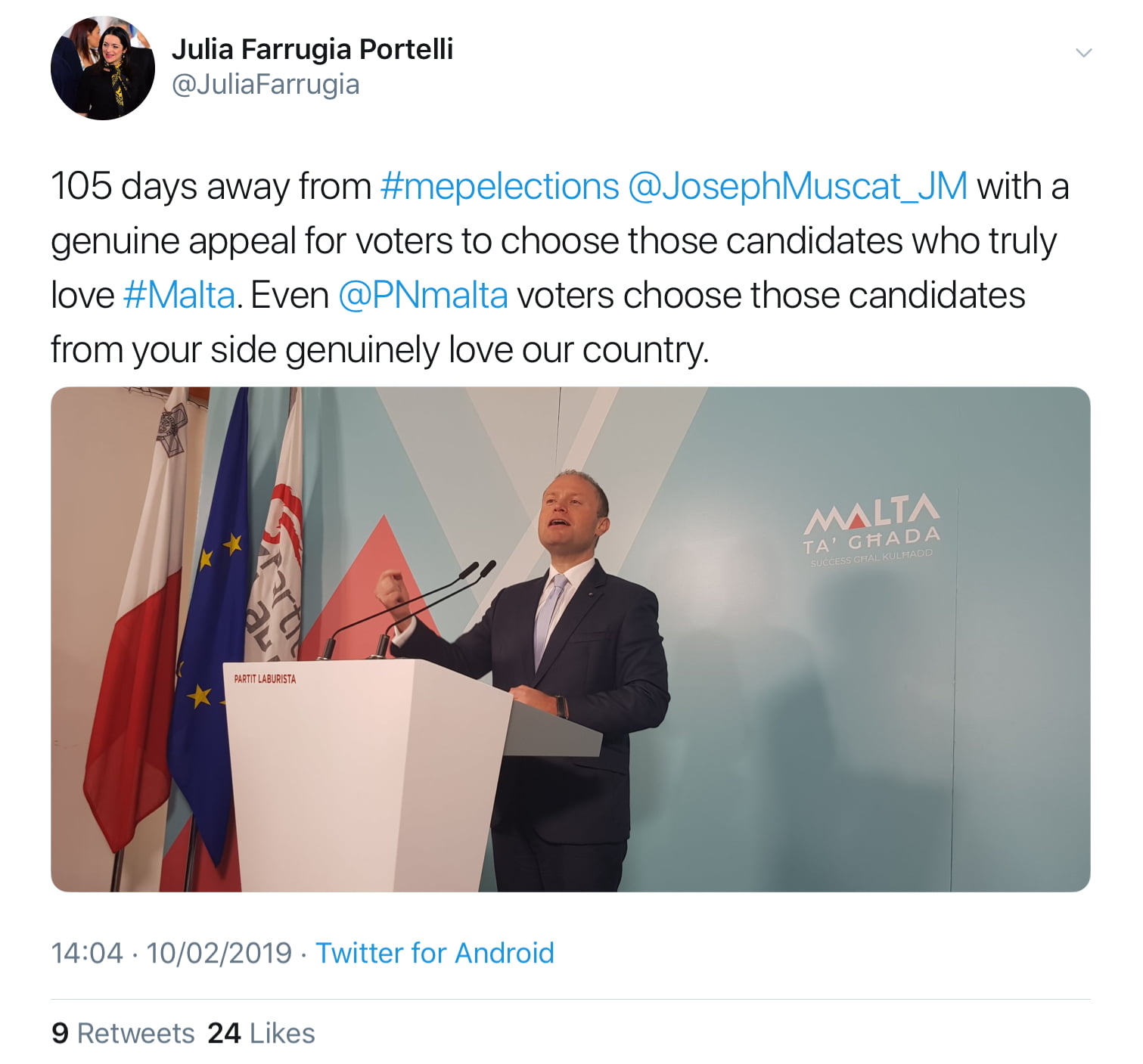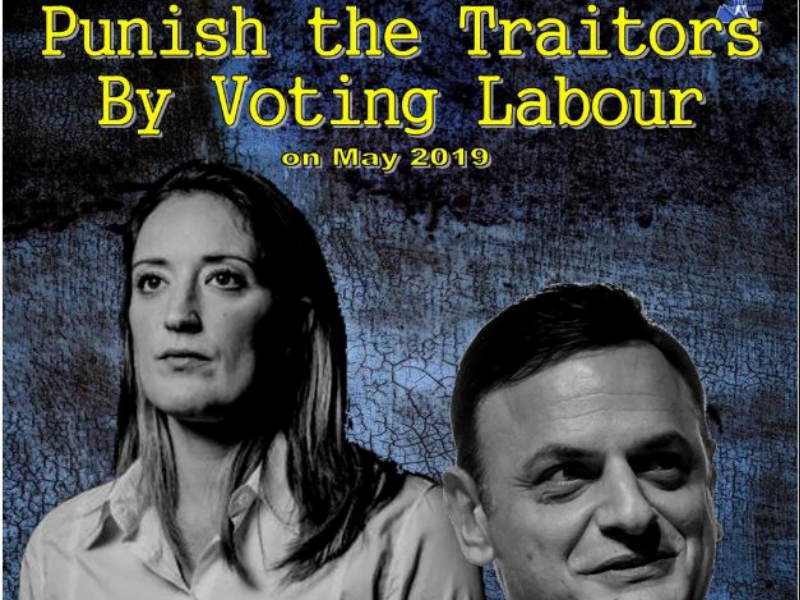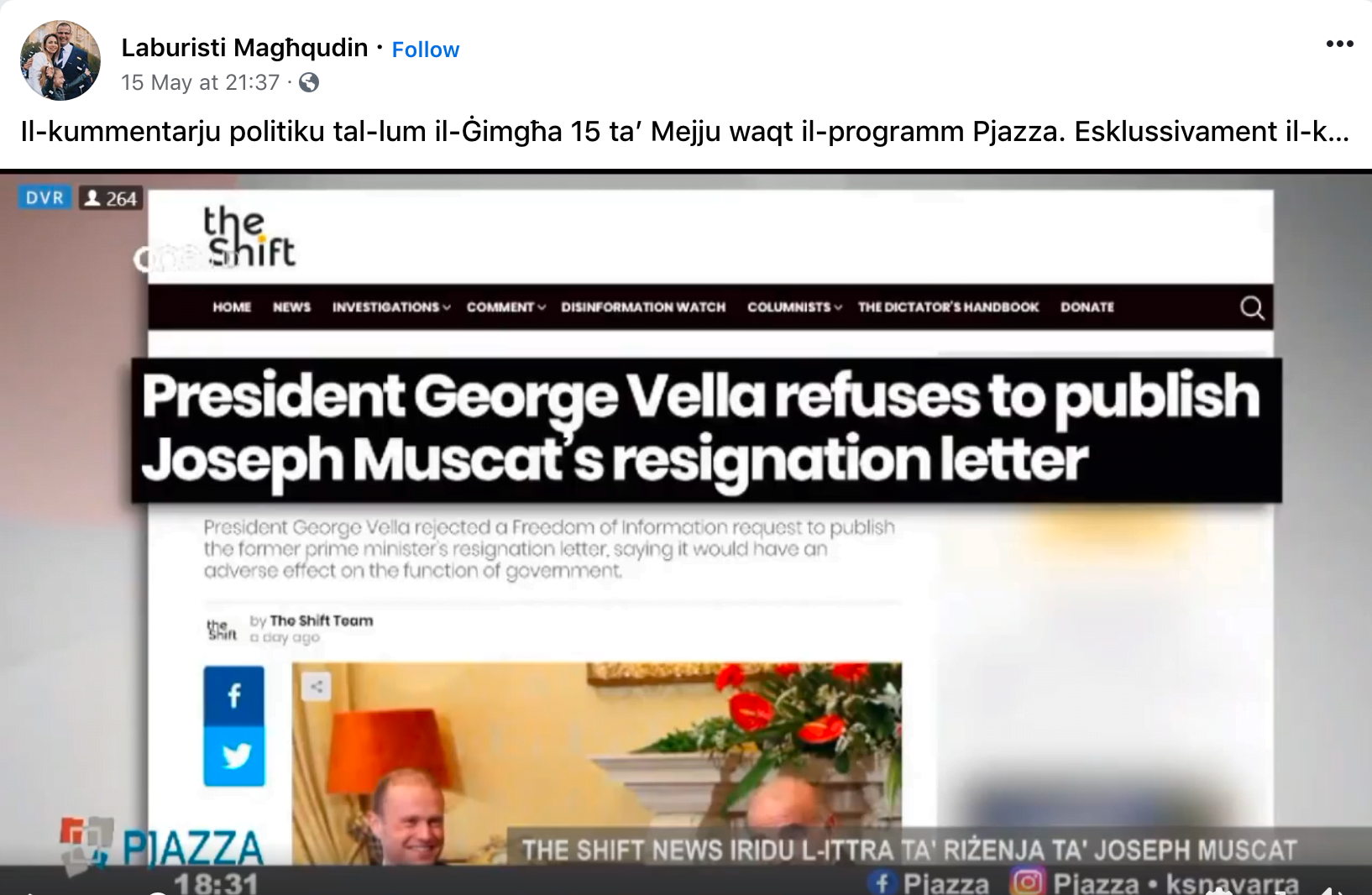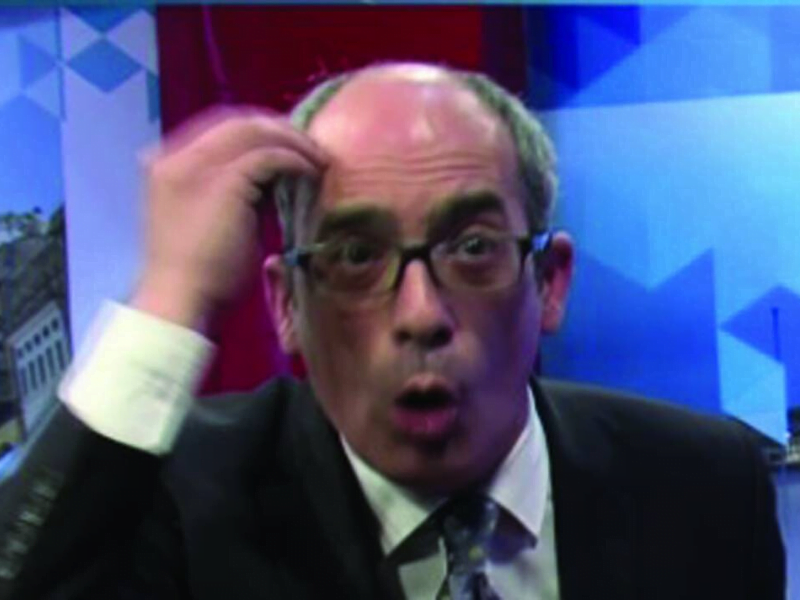When The Shift started monitoring government disinformation tactics in 2018, it found that one of the main strategies was to label anyone critical of the government or its officials a ‘traitor’ or an ‘enemy of the people’.
You were even more of a ‘traitor’ if you voiced this criticism in an international setting because, according to this description, your mission was not to hold the government to account but to ‘speak against Malta’ to tarnish the country’s reputation.

Tourism Minister Julia Farrugia Portelli quotes Muscat’s dog-whistle to voters to shun “traitors” at the MEP elections in May 2019.
Labelling your political opponents ‘traitors’ is an especially effective and timeless tool. It bypasses the dialectic and goes straight for the accusations of betraying the nation to such a heinous degree that it warrants hanging, drawing and quartering.
Throwing the word ‘traitor’ or ‘treason’ around, detached from its actual meaning, is a weapon for delegitimising political opposition and dissent. It’s a way of rallying your troops and telling them they don’t need to respect the enemy — they just need to destroy them, and it works most times.
The pattern in 2018
In 2018, when Nationalist Party MEPs David Casa, Roberta Metsola and Francis Zammit Dimech spoke out in the European Parliament against all the signs of corruption floating around the then tourism minister, Konrad Mizzi, and around Joseph Muscat’s chief of staff Keith Schembri, the Labour Party deployed its online swarms describing the three MEPs as ‘traitors’, ‘Malta’s shame’ and calling for them to be removed or attacked.

Meme labelling Opposition MEPs Roberta Metsola and David Casa ‘traitors’ for criticising the Labour government.
Metsola and Casa drew most of the swarm’s ire. Insulting them in writing was not enough; countless memes were also created to amplify the message. It was not long before the TV station owned by the Labour Party ran news headlines describing how Metsola spends her time in Brussels disparaging Malta.
The pattern in 2020
Fast forward to 2020. Robert Abela has replaced Joseph Muscat as Malta’s Prime Minister and Mizzi and Schembri are now keeping a low profile in the hope that people will forget about them, but the ‘traitor’ narrative has been deployed once more.
The Shift even outed efforts online to disassociate Schembri’s name from journalist Daphne Caruana Galizia’s assassination – findings that emerged through court proceedings – and trying to manipulate the online narrative with a new website.
Its pattern is identical to that observed two years ago, when The Shift investigated Muscat’s online hate machine. While some of the controversies may be different, most targets have not changed – the pattern is the same in terms of discrediting and dehumanising those critical of the government. Now, it operates in Abela’s name.
On the same lines, the Labour Party’s TV station One retained its penchant for running headlines about those who ‘speak against Malta’ and those with an agenda ‘against the Labour Party’. So Matthew Caruana Galizia was recently the focus of a news report on the Party’s propaganda station that led to a barrage of insults against him and his mother, Daphne Caruana Galizia, on the day marking 31 months since she was brutally assassinated in a car bomb.
1) "A shit like his mother who is burning in hell." pic.twitter.com/LrLtSiBR5T
— Matthew Caruana Galizia (@mcaruanagalizia) May 15, 2020
Propaganda host Karl Stagno Navarra, paid by taxpayers to push the government’s agenda, uses his programme on the Labour Party’s TV station to attack government critics and journalists.
Stagno Navarra has revived these attacks with renewed intensity under Abela – a tactic deployed by his predecessor every time the government’s back was against the wall because of one scandal or another.
The Shift has not escaped his attacks; his latest vitriol spurred by this news portal revealing that President George Vella is refusing to publish Muscat’s resignation letter.

Karl Stagno Navarra’s programme on the TV station owned by the Party in government criticised The Shift for demanding former Prime Minister Joseph Muscat’s resignation letter – shared on Labour Party’s online groups.
The old normal
In April, two police reports were filed by the NGO Repubblika, in which the organisation asked the police to investigate whether the army and the prime minister were in any way responsible for the death of migrants at sea by failing to rescue them
Prime Minister Robert Abela responded by calling a press conference where he went on to imply that those who had filed the complaint wanted to see him and army officials “serve life in prison”.
The timing of the police reports was fortuitous for the government’s propaganda machine. The health authorities were working around the clock to limit the spread of COVID-19 on the islands and the news of the reports played right into the propagandists’ hands.
What better way to rally your supporters than by depicting your political opponents as craven individuals set out to cause harm to the nation’s prime minister and therefore to the nation itself?
Memes immediately surfaced labelling the four signatories of the reports as ‘traitors’ working against Malta in the midst of a global pandemic. The NGO received an unprecedented amount of abuse. Some of Facebook’s favourite angry men such as Mario Philip Azzopardi and Tony Zarb were quick to create a string of messages and memes all similar in scope and tone.

Former Labour union leader Tony Zarb, now a ‘consultant’ to the government and on the taxpayer gravy train, occupies most of his time insulting government critics online.
Chief among their targets were Opposition MP Jason Azzopardi and Professor Vicki Ann Cremona of Repubblika. Media outlets were not spared, and neither were any of the NGOs that expressed views that ran counter to those of the government.
All of them were deemed to be espousing an ‘anti-Malta’ message. Some were even compared to the Maltese fascist sympathisers by the likes of Labour MP Glenn Bedingfield.
MEP Roberta Metsola, was once again featured on the Labour Party’s propaganda outlet One TV, which reported that Metsola ‘spoke against’ Malta by voicing her criticism about Malta’s citizenship scheme during one of the European Parliament’s LIBE committee meetings.
Lol.
Four Labour MEPs vote in three different ways on one of the most significant resolutions of the year, a Prime Minister so cripplingly insecure that it's become embarrassing and Labour is worried that I think #Malta shouldn't sell passports.
Clueless is an understatement.🤫 https://t.co/0igesaFFNs
— Roberta Metsola (@RobertaMetsola) April 26, 2020
The fact that she did so during a global pandemic made her ‘crime’ that much worse. Fortunately for One TV, Mestola was chastised by a Hungarian MEP who criticised her insistence on addressing corruption. The irony.
Why it keeps working
By portraying the opposition, civil society activists and the independent media as an existential threat to the nation, any government can transform political competition into an issue of national survival and stability.
By equating national identity with unwavering support for those in power, governments can assert their legitimacy, regardless of their actions. But Abela went a step further.
By suggesting possible harm might come to him (in the midst of a global pandemic) he was able to arouse in his supporters’ feelings of fear as well as an emotional connection to him. They then went on to do the rest, inflicting harm on others as long as it wasn’t him.
Truth, consistency and likability aren’t necessary for getting people to absorb and parrot your viewpoint. It doesn’t really matter whether the issues are migration or corruption. It also doesn’t matter whether it is 2018 or 2020 and whether the prime minister is Muscat or Abela.
What does work is incessant repetition (the saying repetita iuvant works even if in a non-didactic context), distractions from the main issue, deftly sidestepping counterarguments and provoking people who dislike you in order to get the attention of people who might like you.












